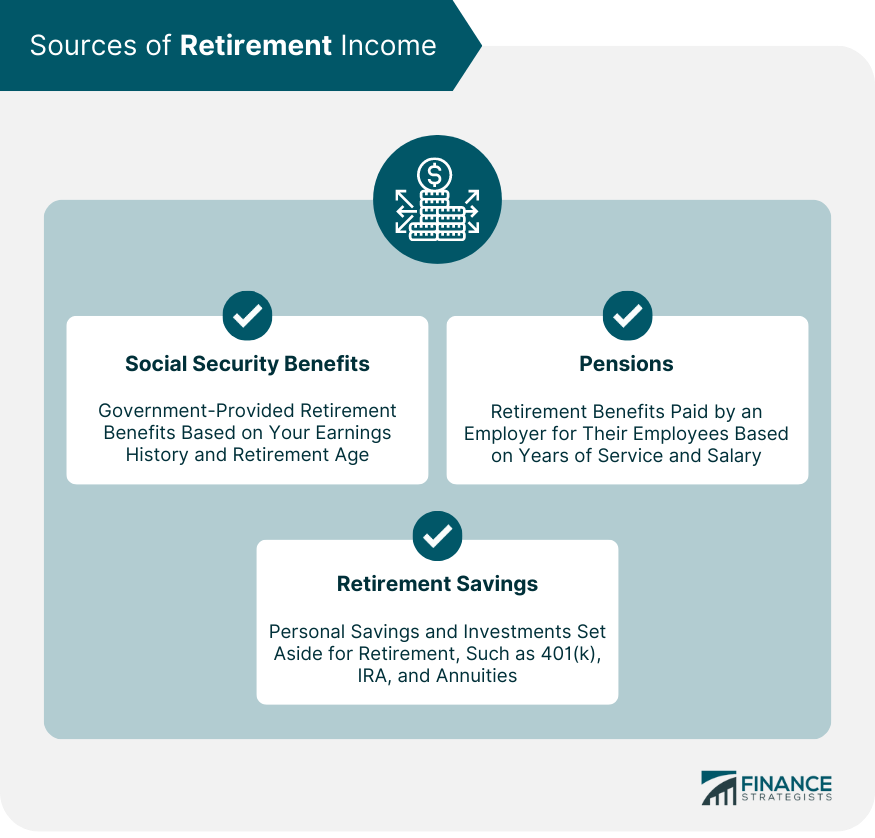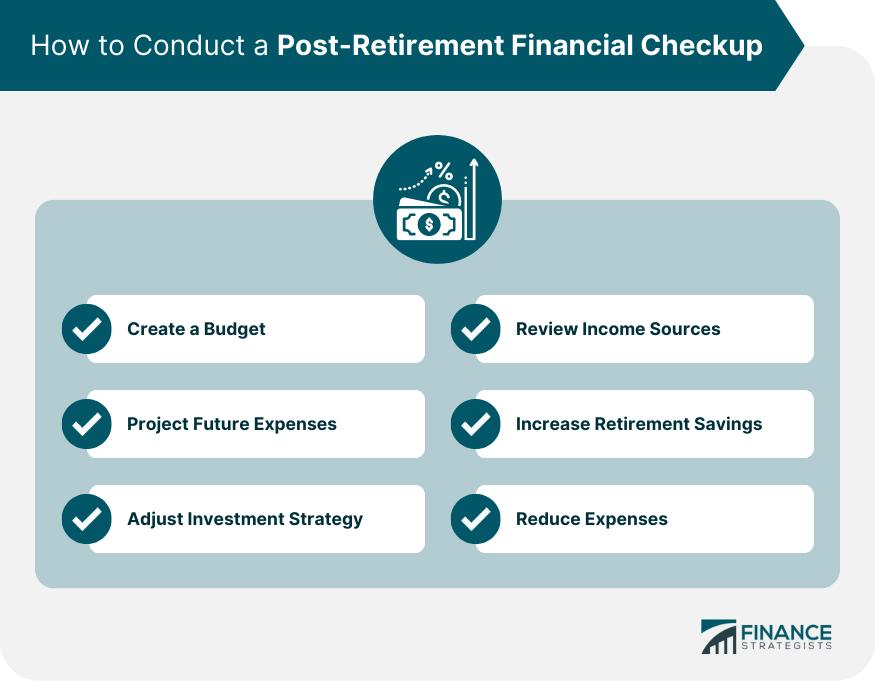A post-retirement financial checkup is an assessment of your financial health after retiring. This process helps retirees evaluate their income sources, expenses, and overall financial plan to ensure they can maintain their desired lifestyle and meet their financial goals. Conducting regular post-retirement financial checkups is crucial for several reasons. Firstly, it helps retirees identify any potential financial gaps, allowing them to make adjustments to their spending, investments, or income sources. Secondly, it provides an opportunity to reevaluate financial goals and objectives, ensuring that they remain aligned with the retiree's changing needs and circumstances. Social Security benefits are a primary source of income for many retirees in the United States. These benefits are based on the individual's lifetime earnings, with the amount received determined by the age at which they choose to start collecting benefits. As the Social Security program undergoes changes and faces financial challenges, it is essential for retirees to stay informed about the current status and future prospects of the program. Pensions are another common source of retirement income, particularly for those who have worked in the public sector or for large corporations. Typically, pension benefits are based on factors such as years of service, salary history, and the specific terms of the pension plan. While pensions can provide a steady stream of income, they may not be sufficient to cover all expenses in retirement, making it necessary to consider additional sources of income. A 401(k) is an employer-sponsored retirement savings plan that allows workers to save a portion of their income on a pre-tax basis. Contributions to a 401(k) may be matched by the employer, providing an added incentive to save. Upon retirement, individuals can begin withdrawing from their 401(k), with the withdrawals being taxed as regular income. A well-funded 401(k) can be a significant source of retirement income. An Individual Retirement Account (IRA) is another popular retirement savings vehicle. There are two main types of IRAs: Traditional and Roth. Traditional IRAs offer tax-deferred growth, while Roth IRAs provide tax-free growth and withdrawals in retirement. IRAs can be a valuable supplement to other retirement income sources, particularly for those who do not have access to a 401(k) or pension plan. Annuities are insurance products that can provide a guaranteed stream of income in retirement. Retirees can purchase annuities with a lump sum or through a series of payments, and the income received can be either fixed or variable, depending on the specific annuity contract. While annuities can offer financial security and predictability, they may also come with higher fees and less flexibility compared to other retirement savings options. Healthcare costs are a significant expense for many retirees, with Medicare only covering a portion of these expenses. It is essential to budget for out-of-pocket healthcare costs, including premiums, deductibles, copayments, and services not covered by Medicare. Additionally, long-term care insurance may be worth considering, as it can help cover the cost of services like assisted living or nursing home care that may be needed later in life. Housing costs can be another substantial expense in retirement. Whether a retiree chooses to downsize, relocate, or stay in their current home, it is important to consider the costs associated with property taxes, insurance, maintenance, and utilities. Additionally, retirees should evaluate the potential benefits and drawbacks of owning versus renting, as well as any potential financial assistance programs available to help reduce housing costs. Retirees must also account for other living expenses, such as food, clothing, transportation, and leisure activities. It is crucial to have a clear understanding of these costs and adjust spending habits as needed to ensure that retirement income is sufficient to cover them. In some cases, retirees may need to consider making lifestyle changes or finding ways to generate additional income to maintain their desired standard of living. Creating a budget is a critical step in the post-retirement financial checkup process. This budget should include all sources of income, such as Social Security, pensions, and retirement savings, as well as fixed and variable expenses. By having a clear understanding of income and expenses, retirees can make informed decisions about their financial future and identify areas where adjustments may be needed. A thorough review of income sources is essential to ensure that all potential sources of retirement income are being utilized effectively. This review should include an assessment of Social Security benefits, pension payouts, retirement savings withdrawals, and any other income streams, such as rental income or part-time work. Retirees should also consider the potential impact of inflation on their income sources and make adjustments as needed to maintain their purchasing power. Projecting future expenses is a crucial aspect of a post-retirement financial checkup. This process involves estimating the costs of healthcare, housing, and other living expenses over the course of retirement. Factors to consider include inflation, changes in lifestyle, and the potential need for long-term care. By having a clear understanding of future expenses, retirees can make informed decisions about their financial plan and ensure they have adequate resources to cover their needs. If a post-retirement financial checkup reveals that current retirement savings may not be sufficient to cover expenses, retirees may need to consider increasing their savings. This can be achieved by making additional contributions to retirement accounts, such as IRAs or 401(k)s, or by investing in other assets, such as stocks or real estate. Increasing retirement savings can help ensure that retirees have the resources they need to maintain their desired lifestyle. Another way to make adjustments to a retirement plan is by reassessing the investment strategy. This may involve revisiting the asset allocation, risk tolerance, and investment objectives to ensure they remain aligned with the retiree's financial goals and needs. In some cases, adjustments may be necessary to generate more income, protect against inflation, or preserve capital. If increasing retirement savings or adjusting the investment strategy is not sufficient to close the gap between income and expenses, retirees may need to consider reducing their expenses. This can involve cutting discretionary spending, downsizing, or relocating to a more affordable area. By making conscious decisions to reduce expenses, retirees can help ensure that their financial resources last throughout their retirement. A post-retirement financial checkup is a critical process that retirees should undertake to assess their financial health after retiring. The checkup involves evaluating income sources, expenses, and overall financial plans to ensure that retirees can maintain their desired lifestyle and meet their financial goals. Conducting regular post-retirement financial checkups is essential, as it helps identify any potential financial gaps and provides an opportunity to reevaluate financial goals and objectives. During the checkup, retirees should assess income sources, including Social Security benefits, pensions, and retirement savings accounts like 401(k) and IRAs, to ensure they are being utilized effectively. Additionally, they should evaluate potential expenses such as healthcare costs, housing expenses, and other living expenses. Retirees should also project future expenses, considering inflation, lifestyle changes, and the potential need for long-term care. After completing the post-retirement financial checkup, retirees may need to make adjustments to their financial plan by increasing retirement savings, adjusting investment strategies, or reducing expenses. By taking these steps, retirees can help ensure that they have the resources they need to maintain their desired standard of living throughout their retirement. Overall, regular post-retirement financial checkups are essential to achieving a secure retirement.What Is a Post-Retirement Financial Checkup?
Income Sources to Review in a Post-Retirement Financial Checkup
Social Security Benefits
Pensions
Retirement Savings

Expenses to Review in a Post-Retirement Financial Checkup
Healthcare Costs
Housing Costs
Other Living Expenses
Assessing Income and Expenses During a Post-Retirement Financial Checkup
Create a Budget
Review Income Sources
Project Future Expenses
Making Adjustments After a Post-Retirement Financial Checkup
Increase Retirement Savings
Adjust Investment Strategy
Reduce Expenses

Final Thoughts
Post-Retirement Financial Checkup FAQs
A post-retirement financial checkup is a process of evaluating your financial health after retirement to ensure you have enough income to meet your expenses.
It is recommended that you conduct a post-retirement financial checkup annually to ensure that your retirement plan aligns with your current financial situation.
A post-retirement financial checkup helps you assess your income, expenses, and make necessary adjustments for a secure retirement.
You can consult with a financial advisor, retirement planner, or estate planner to conduct a post-retirement financial checkup.
You should consider your sources of retirement income, expenses in retirement, and assess your retirement plan by creating a budget and projecting future expenses.
True Tamplin is a published author, public speaker, CEO of UpDigital, and founder of Finance Strategists.
True is a Certified Educator in Personal Finance (CEPF®), author of The Handy Financial Ratios Guide, a member of the Society for Advancing Business Editing and Writing, contributes to his financial education site, Finance Strategists, and has spoken to various financial communities such as the CFA Institute, as well as university students like his Alma mater, Biola University, where he received a bachelor of science in business and data analytics.
To learn more about True, visit his personal website or view his author profiles on Amazon, Nasdaq and Forbes.











